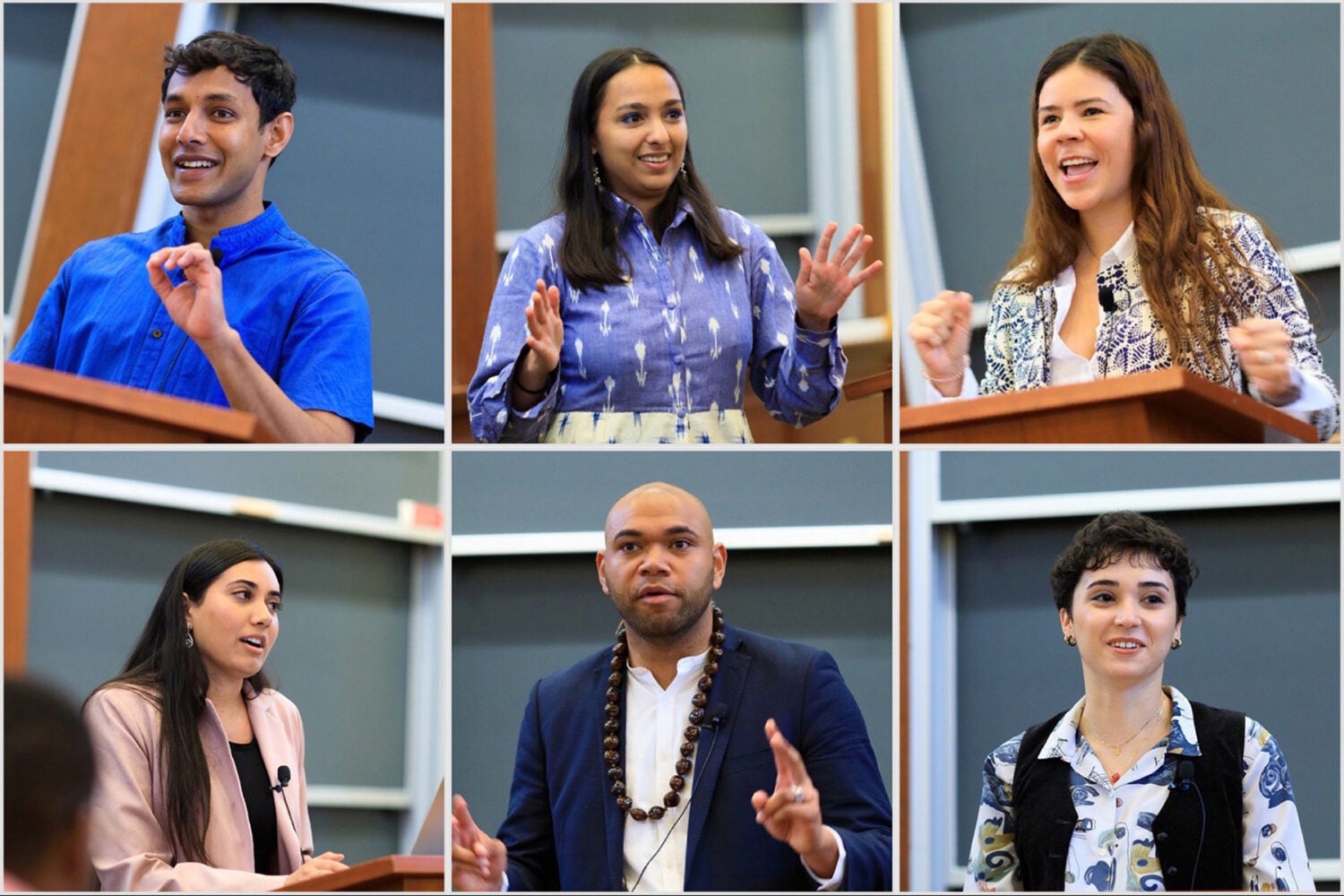This spring, six members of the Class of 2023 delivered talks to their peers — final words of wisdom on everything from the power of community to familial pride to lessons learned from nature. Here’s what they had to say.
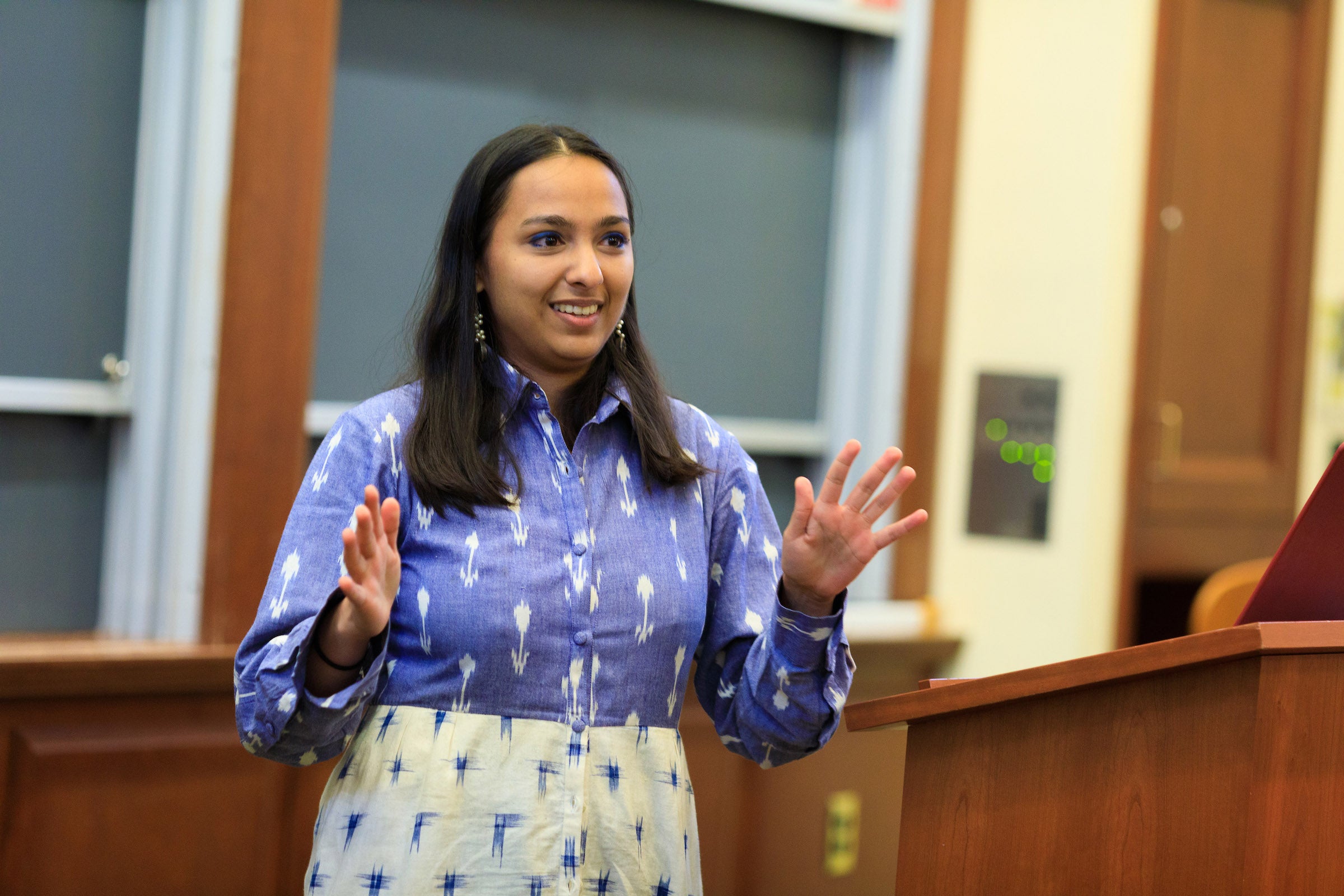
Nitika Khaitan LL.M. ’23: ‘You showed up for us’
As a lawyer who practiced in Delhi during a time of political upheaval, graduating student Nitika Khaitan LL.M. ’23 brought some hard-earned lessons to her graduating student talk. She described an experience that challenged any hope she felt as a human rights lawyer and how it taught her “to look for the light that gets in through the cracks.”
Five days after Khaitan began practicing law in May 2019, the country’s Hindu nationalist Prime Minister began his second term and, she said, targeted Muslims with an internet shutdown and with a discriminatory citizenship law. This set off a nationwide wave of protests. “For a brief moment, protesting becomes mainstream. It becomes a thing people do after office — go to a protest and have chai. And so, my first six months as a lawyer is the most exciting time ever.”
She hoped the protests would stop the citizenship law, but it wasn’t to be. In February 2020, Khaitan said, “Delhi sees its worst-ever anti-Muslim violence. At these very same protest sites, Hindu nationalist mobs attack Muslim communities.” The situation worsened after COVID, when she said anti-Muslim violence intensified.
That experience, she said, was spiritually draining. “For the rest of the year, I and many other people I knew unraveled. Some days, I managed to take on another client and file another bail application. Some days, it’d be 3 p.m. before I could convince myself that it was okay to leave the blanket cave that I had built on my bed.”
Yet Khaitan persevered, and ultimately won a landmark bail judgment under India’s anti-terror law. But she says that the rewards didn’t necessarily come through wins. “Despite the heartbreak that lawyering caused, in the end, lawyering actually ended up being the opposite of disillusioning and became the only thing that keeps me going. There were plenty of clients who didn’t get bail for months and I’d call their family members all frantic about how to explain to them that it’d take more time. And they’d just say, ‘You showed up for us when no one else did, so we know you’re doing what you can’.’”
Most graduating students may never have to work under circumstances quite that challenging, Khaitan said. “But I don’t think any of us will escape the mental health implications, anxiety, depression, heartbreak, and the loss of hope inherent in the work we do. And I hope we’re able to remember the importance of showing up, even when we think there isn’t any light to be seen.”
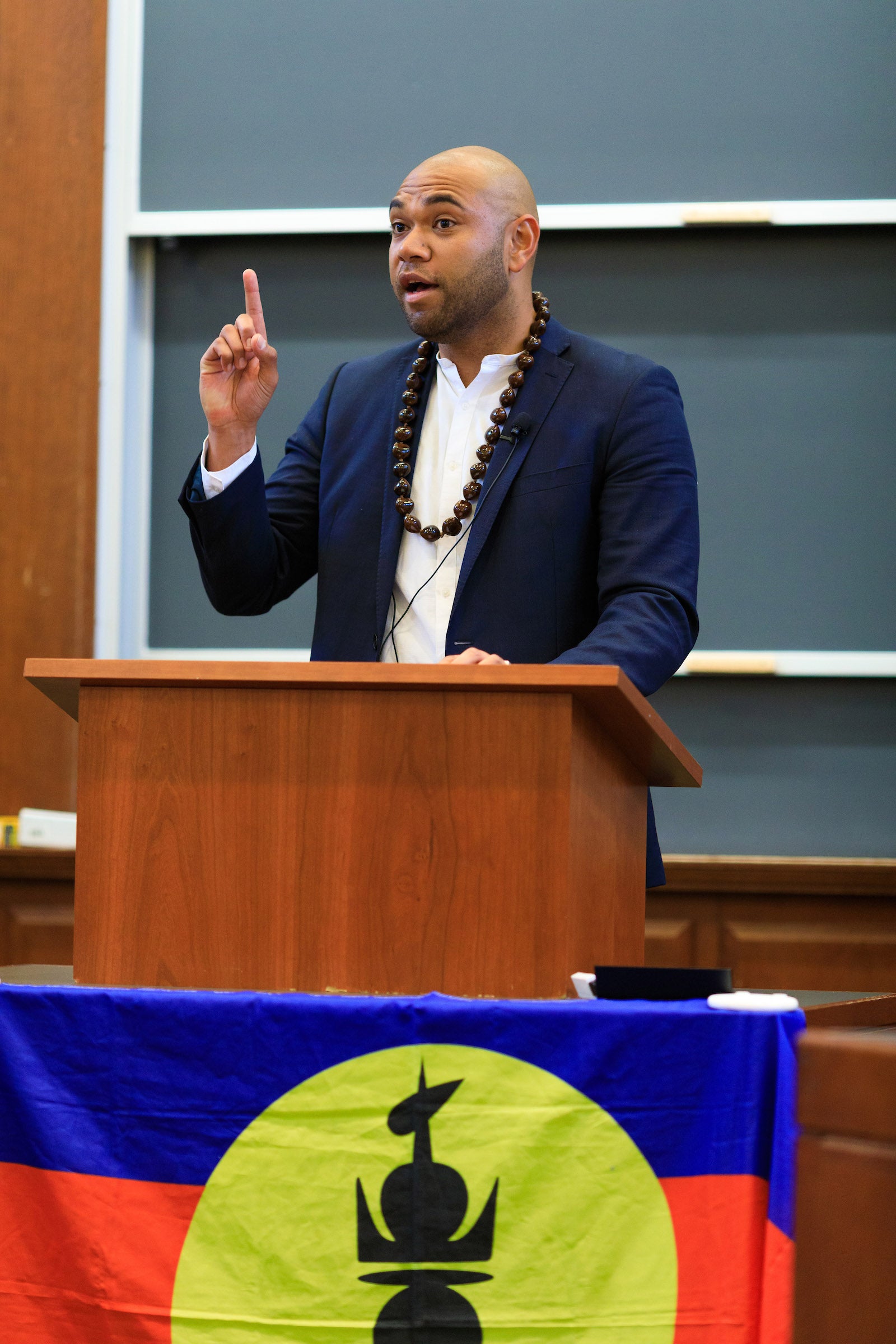
Joe Xulué LL.M. ’23: Honoring the resilience of Kanak heritage
Joseph Xulué LL.M. ’23 will make a small bit of history when he graduates next month, as the first Kanak to attend Harvard Law School — and likely the first to rise to a position of power and influence in the United States. The Kanaks are an indigenous population of New Caledonia, with a worldwide population of about 120,000; only about 10 percent live elsewhere. As Xulué said in his talk to the graduating class, his accomplishments are bound to be connected to his heritage.
“My life has been generally defined by one tagline,” he told the audience. “And it’s become a running joke for me and my friends back home — Joe Xulué, the first Kanak to (insert activity).” He’s already been the first to graduate from the University of Auckland Law School as well as Harvard Law School, and to be admitted as a barrister and solicitor of the High Court in New Zealand. And, he joked, if his enthusiasm for flag football pays off, he could also be the first to play in the Super Bowl.
Yet the lessons of his culture run far deeper, he said. New Caledonia is a territory of the French Republic located near Australia, and the Kanaks hold tightly to their own cultural identity. “For at least 5000 years, my people have developed systems of governance and law, navigated the largest ocean in the world long before Europeans came to our shores in the 18th century, created art, told stories and kept a culture alive despite the attempted cultural genocide that came with years of colonization.” Thus, respect for indigenous cultures is a lesson that he will carry into his career. “To be Kanak in a place of privilege, power and opportunity like HLS, means to live a life that honors the spirit and resilience of my people while giving credence to unique values and cultures of everyone else.”
If he is the first Kanak at Harvard Law School, he said, his dream is to not be the last. And he said that mentoring young people as part of the Black Law Students Association and the Native American Law Students Association has been one of the highlights of his time here. His goal, he said, is not to change the world so much as to help others who will. “I will continue to keep pushing myself out of my comfort zone to enter these places, spaces and institutions of power, privilege and opportunity so that I can inspire and, most importantly, support indigenous peoples as they make their own journeys on their way to changing the world.”
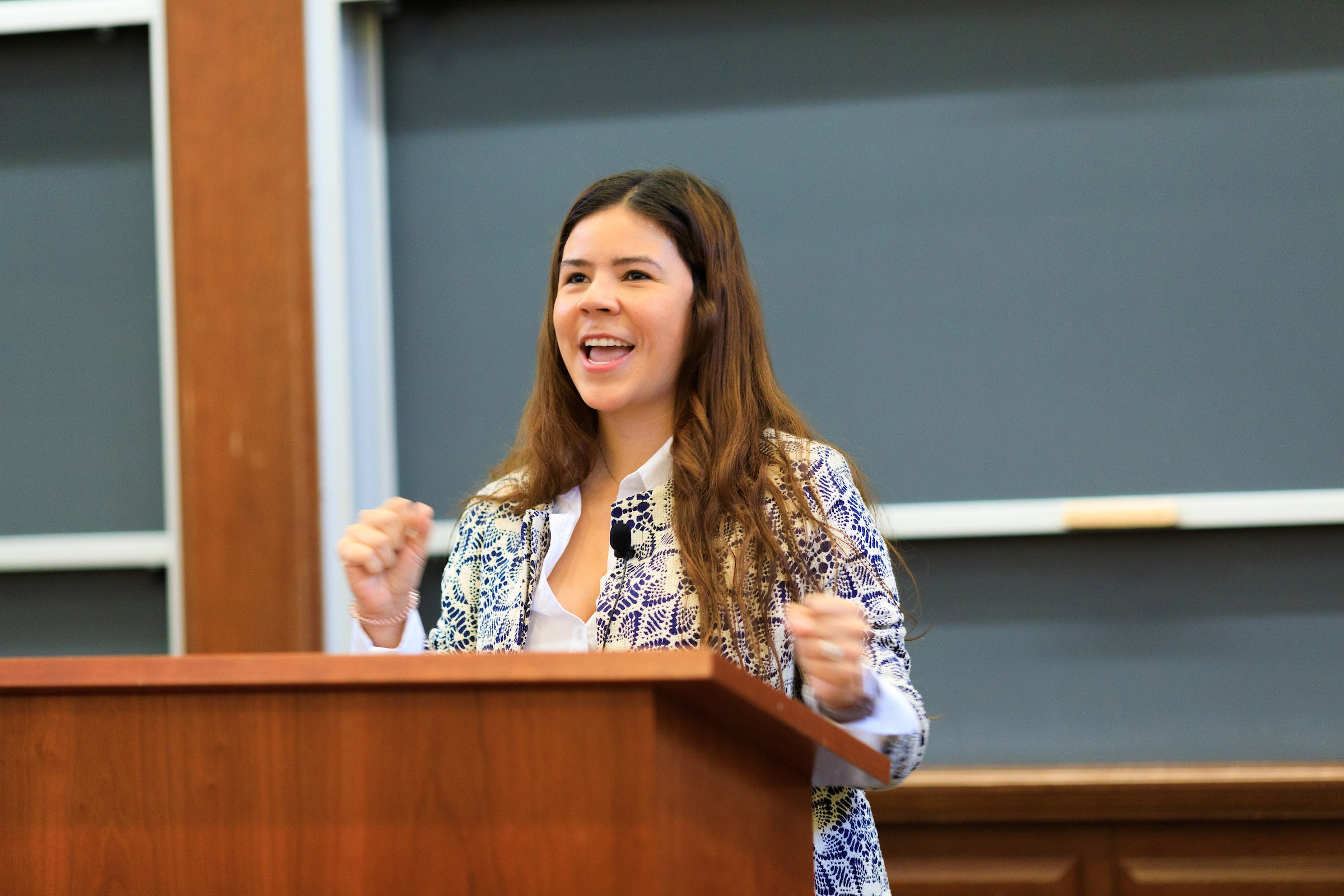
Catalina Perdomo LL.M. ’23: Silencing the censor
Did you go through law school thinking you just couldn’t do it, or that you’d never get that dream job afterward? Then you need to stop listening to your internal censor, Catalina Perdomo LL.M. ’23 told the graduating class. “Acknowledge the presence of the censor in your brain and silence its noise,” she advised. “Whatever works for you, do it.”
A native of Valledupar, Colombia and a descendant of the Kankuamo tribe, Perdomo previously worked as corporate lawyer for an airline, and focused on research on legal design at Harvard Law School. She also writes essays and fiction, and drew on her love of crime and fantasy stories for her lecture. She told the graduates that most of us are torn between two internal voices: The censor and the superhero.
She grew up without the latter, she said, because her small town in Colombia lacked a movie theater. “I needed to get scrappy about where to find my own heroes. Without looking further, I discovered a superhero in my own household: my grandfather, Manuel. [He was a hero] in a very Batman-like fashion — without the old money storyline, of course.” Manuel had fled his home because “his political views were not liked by many”; he started over in the city and raised nine children, including Perdomo’s mother, who all attended college. “His decision allowed my family to break the cycle of extreme poverty in one generation, where families in Colombia usually take fourteen.”
If she met her superhero at home, she met her censor while applying for jobs before graduation. “I came to Harvard on a mission: to escape from a career I did not like anymore and pursue my passion for legal innovation. But my censor, and life, would not make that easy. I have never received so many rejections in my life, in such a short period of time. I was sad, tired and about to quit.” Her ultimate dream job rejected her as well — until she stared her censor in the eye by making a followup phone call and convincing the firm to hire her.
She urged the gradates to stay close to their tribe — since every superhero heeds an ally — and to keep the censor at bay. “I hope we all dare to do the extraordinary things that deep down we want to do, because I promise, beginning May 25: Like Dr. Octopus said in ‘Spiderman 2,’ you’ll have the power of the sun in the palm of your hands.”
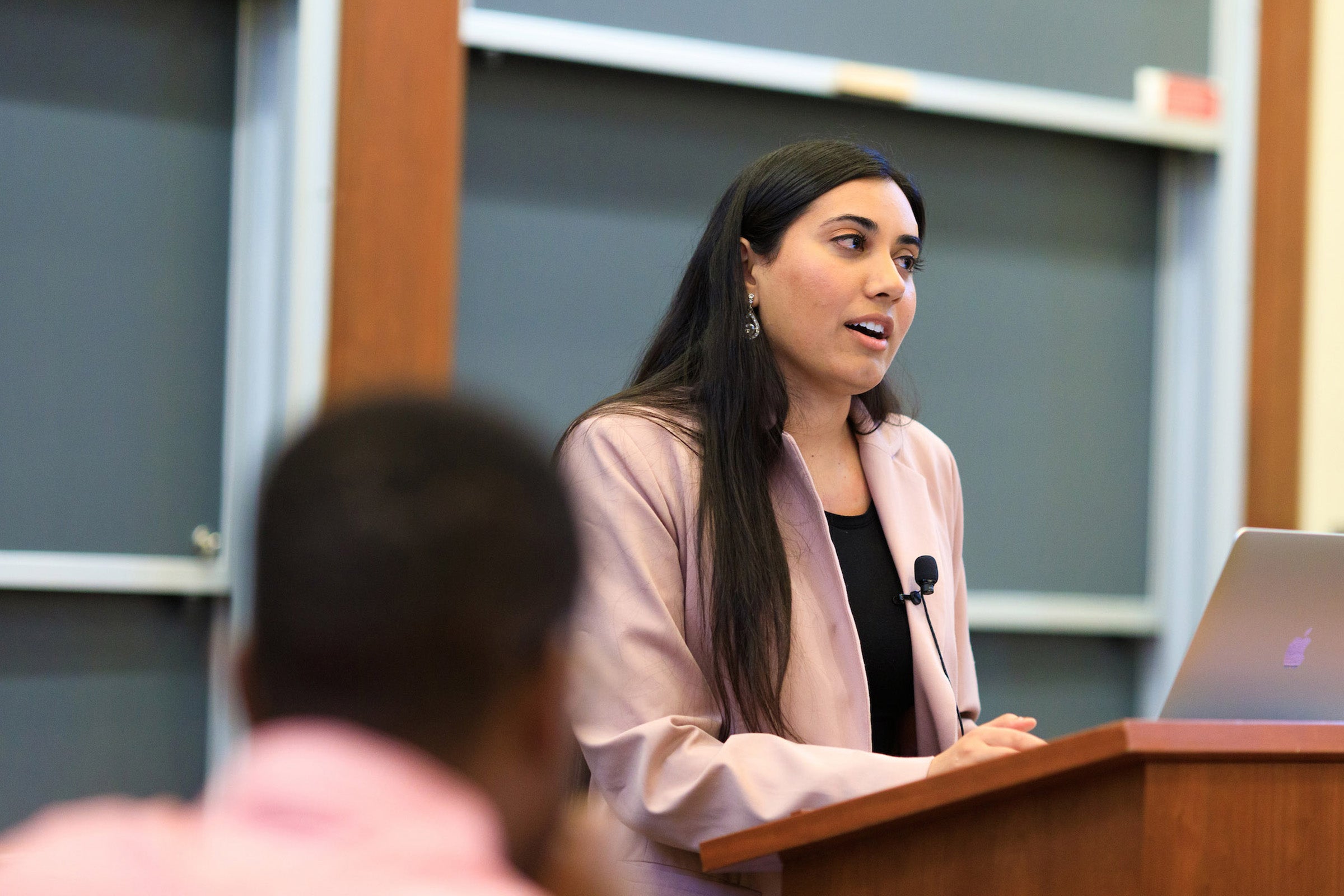
Rosie Kaur J.D. ’23: ‘The healing power of community love’
Her upcoming graduation will be an especially significant moment for Rosie Kaur J.D. ’23, who lost her father during her first year of law school. “This is not a dream my dad had for me, because he didn’t even know how to dream this,” she told the class during the two-day series of graduating student talks. As a graduate she’ll honor not only her father, but her ancestors who were farmers in Punjab, India. “They dreamed this dream through the manifestation of the labor they sowed into this current life. They dreamt it through their love and light, through a deep hope for a better future.”
Kaur came to Harvard Law School after professional experience in California’s Bay Area, where she worked in an impact consulting firm and served as the civic engagement manager of an education nonprofit. She was the president of the South Asian Law Student Association and has been a student attorney for Harvard Immigration and Refugee Clinic, Harvard Defenders, and the Employment Law Clinic.
During her talk, she recounted the personal growth and challenges that she experienced in the wake of her father’s death. “I’m planning a funeral, I’m figuring out my family’s financial state, and I’m studying for finals. I do what my dad always taught me to do — I keep my head down, and I grind. That’s the immigrant mentality: When things get hard — like, really hard — you work even harder.” She also found support in the Harvard Law community. “When I was at my lowest of lows here, my friends here gave me that same village mentality that my bones always ached for — they let me use their strength and love to grow myself. Especially during 1L year, especially during Covid. … That is the healing power of community love.”
Most of all, she said, she found a guiding light in her heritage. “There is a tenet in the Sikh religion called Kala, which means eternal optimism. It is an acknowledgment of the struggles of one’s past and a genuine hope for the future.” Farmers in India are still struggling, she noted; and many were recently beaten or imprisoned when they protested laws favoring corporations. “[Yet] they were fearlessly optimistic and hopeful about the future, and they maintained that despite how much pain they were in. That gave me the hope to drive forward.”
Through her journeys, Kaur said, she found the “silver lining” of hope in dark times. “While I never wish any sort of trauma on anyone, the journey that it holds carries a deep strength that can be used as an internal catalyst to create a lot of good. And no matter how scary things feel, that is the power that I plan to carry with me.”
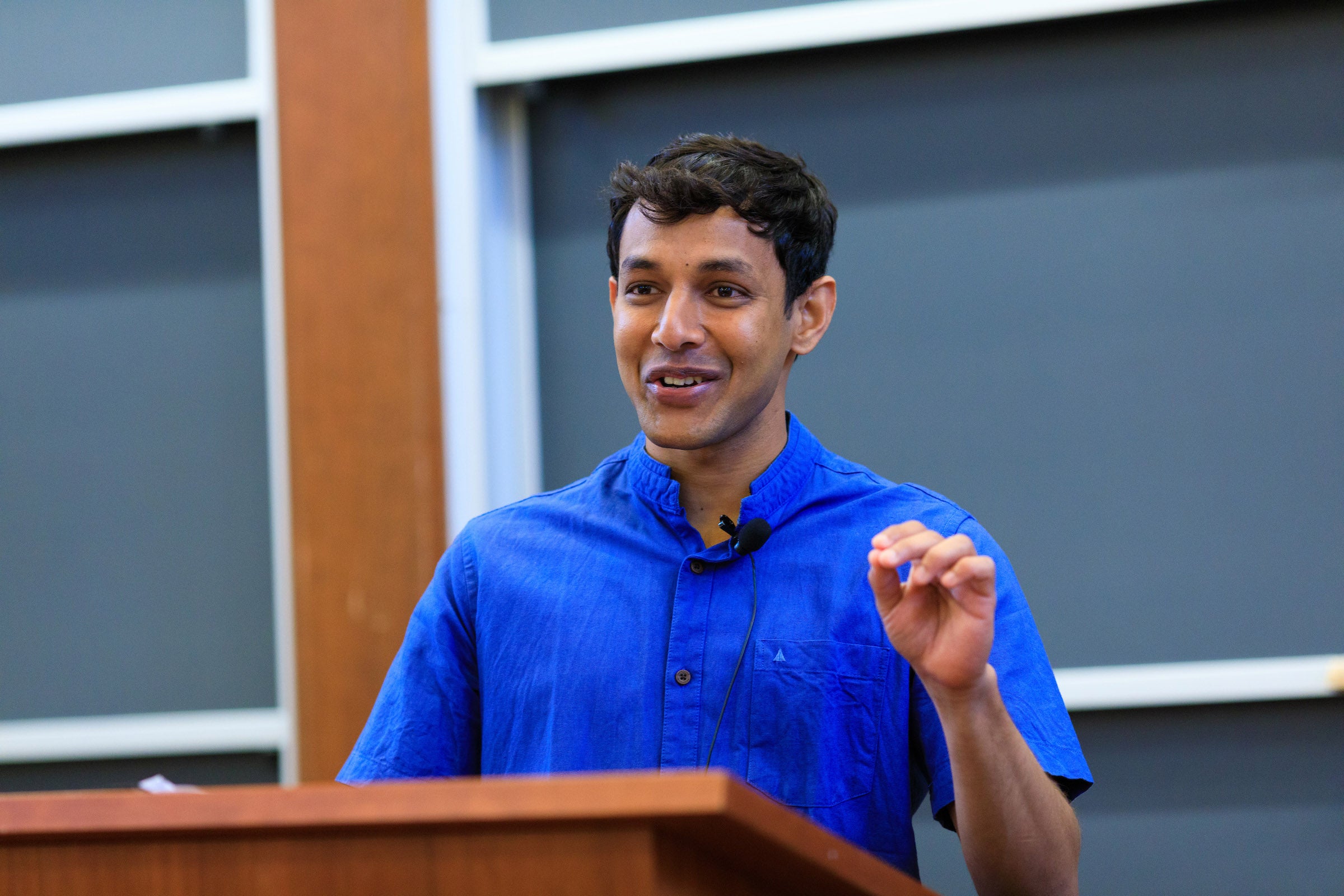
Sanjit Dias LL.M. ’23: Finding kindness in a ‘sea of excellence’
His friends at Harvard Law School know graduating student Sanjit Dias LL.M. ’23 as a lover of humor, wordplay and a good pun. But in giving a talk to the graduating class, he chose to focus on the more serious topic of kindness — and particularly on what it meant to him as a student who’d newly arrived from Sri Lanka.
Dias worked in constitutional and public law litigation before coming to Harvard, and admitted that he’d encountered some loneliness and self-doubt along the way. “Don’t get me wrong, I had many, many close friends back home. But it felt lonely because, while I knew many of them as individuals, each of them already had their own close circle of friends. And so loneliness felt like being on Instagram and seeing friends on a group vacation and feeling FOMO [fear of missing out]. For a long time, I yearned to be a part of a bigger group of friends.”
This he found at HLS, to a greater extent than he’d anticipated. “What I didn’t expect was that, in this sea of excellence and high achievement, there would also be so many people with such an incredible capacity for compassion. I don’t think the admissions committee has a way to control for kindness, which is why it is so striking when you meet these people with such big hearts at law school.”
Kindness, he warned, is costly — especially in law school, where time can be the most valuable commodity. “Kindness looks like straying from the tightly-packed schedule to take a walk with a friend who needs to get something off their chest, or to run an errand for a friend who’s sick. It looks like carving regular time out of your schedule to spend with someone who needs your company and support through a hard time.” Yet he said it makes quite a difference — recalling a moment when he saw classmates rally around a student who faced major surgery and worried about keeping up with classwork. “In this case, kindness looked like teamwork.”
He reminded the graduates not to get caught up in “path dependency” — the notion that you’ll always make your most important contributions to the world by practicing law. The best example, he said, was a classmate who decided to become a bone marrow donor. This involved injecting himself with strong drugs in advance, then flying to another city to sit with needles in his arm for eight hours — all within three weeks of the semester’s end. “This to me was the coolest thing this person ever did during law school.”
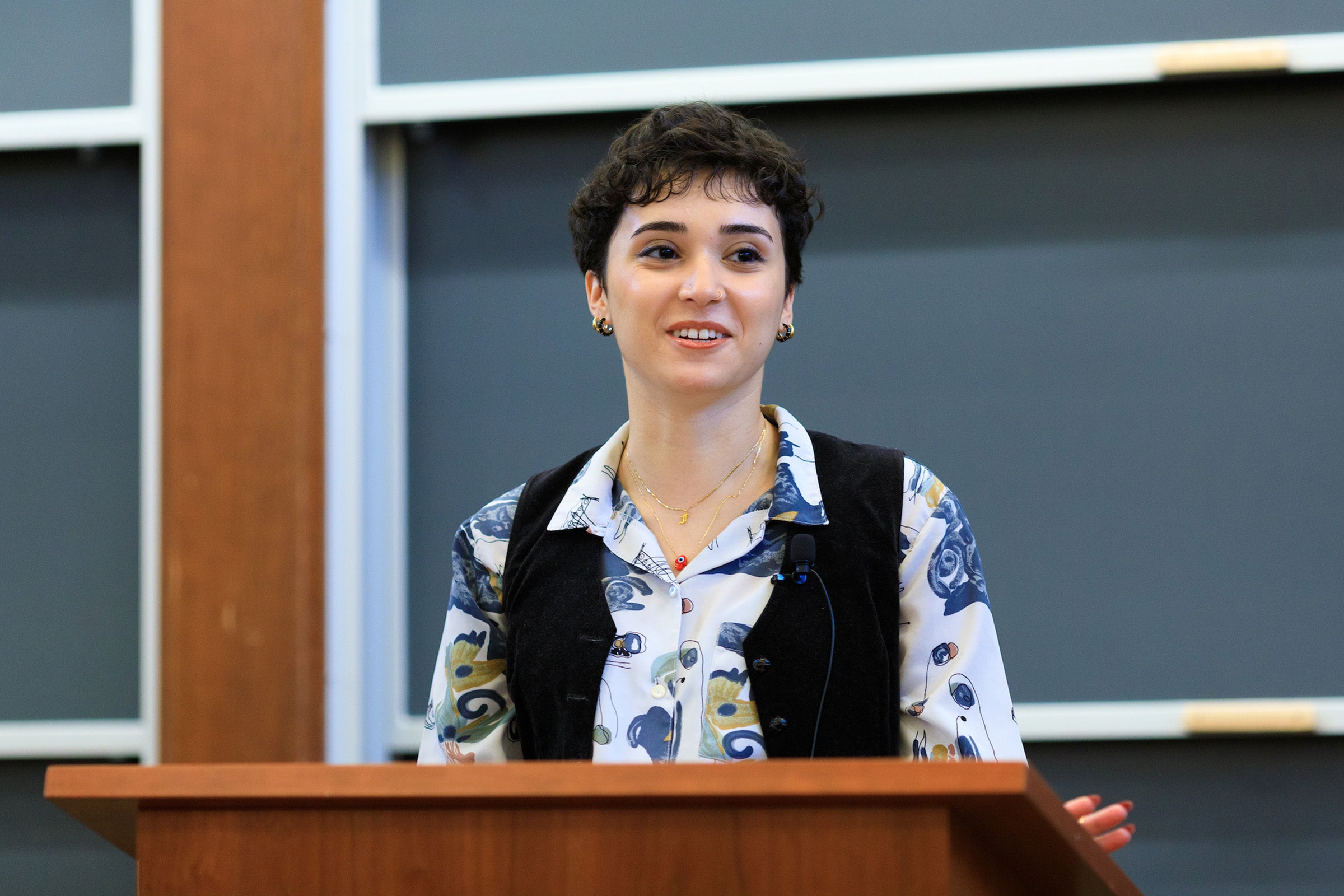
Fjora Arapi J.D. ’23: Nourishing networks
Harvard Law School students can learn a lot from mushrooms, Fjora Arapi J.D. ’23 suggested in her talk to the graduating class. A first-generation student of Albanian descent, Arapi has been involved with the National Lawyers Guild, Harvard Defenders, and The Bell Collective, and has also participated in the Capital Punishment and Crimmigration clinics, as well as the Criminal Justice Institute. But she also maintains a keen interest in nature, which she drew upon for her talk.
Mushrooms, she noted, appear to be growing from the ground, but they’re sustained by a complex system of roots and nutrients beneath the surface. There she found a parallel in the support systems that one needs at law school. “Nature, like life, is messy, it’s complicated, it seems like it’s always on the brink of chaos. But it’s also a network, and that’s how it’s able to exist,” she said.
How, Arapi asked, do trees survive when lack of sunlight keeps nourishment away? They find “mother trees” — older, better connected and more experienced ones that nurture the saplings. Arapi’s own mother trees include her literal mother, “the strongest person I know,” who immigrated to the United States at age 26 without any knowledge of English. But there was also a network of people who saw her through some challenging times. “When I joined the Bell Collective last spring, I was at a very overwhelmed point. I didn’t have enough light. It was people I found here, who found me, who nourished me. These individuals were my underground network, a network built on shared values and passions, one that connected me to the mother trees I never knew I needed.”
The importance of such connections, Arapi said, is a lesson that graduating students can take into the future. “My hope is that we will all remember how interconnected we all are, to honor those who have nourished us, to recognize how much we need each other, and to reckon with our transformative potential to harm as much as help … To be human is to be together, to share, to nurture and support one another in pursuit of a more just future.”
Want to stay up to date with Harvard Law Today? Sign up for our weekly newsletter.
